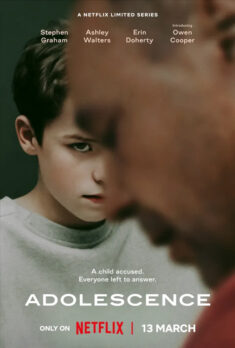Broadcaster
Netflix
First broadcast
13 Mar 2025
Presenter
Phillip Barantini
The new Netflix mini-series Adolescence is having a big impact. It is hard-hitting, and one every parent should watch with their teenager and discuss.
That’s particularly true of episode one, which offers an accurate portrayal of what happens when police arrest and detain you: how your agency is extremely restricted; how alone you are in a cell; how you are spoken to by officers – the epitome of firm but fair; how little your parents will be able to do to help and how you will almost certainly cry.
For viewers working in education, episode two is less believable. It certainly doesn’t reflect my experience of working in schools and PRUs where equally tragic incidents have occurred.
In my experience, the police kept a very low profile in school, interviewed pupils professionally and did their utmost to work with staff to minimise the impact of their presence. Local authority colleagues provided on-site psychological support to staff and students.
Most significantly, the pupils themselves almost universally understood the enormity of what had happened and cared for each other.
Jamie, the young person at the centre of this story, is not untypical. He goes to school where he does okay. Outside of school, he hangs out with a couple of friends and spends time on social media.
At home, his parents work long hours and provide a secure material home. But Jamie knows he is an embarrassment to his dad, who himself doesn’t have a social network other than his nuclear family.
Young people carrying out serious violent acts is not a new phenomenon. The secure unit for young people where I taught was first founded in 1852. Accordingly, murder, motive and investigation are not the main foci of Adolescence’s four episodes.
Instead, the drama poses an altogether different but equally gripping question: what are we doing as a nation to help young people sail the tempestuous transition from childhood to adulthood?
Young people need safe havens to grow into emotionally intelligent adults
There are truths and clear messages here, and it really challenges us to consider and address some big societal issues.
On the more prosaic side are some truths that should be universally acknowledged: that young people crave recognition and meaningful connections; that adolescents can be intentionally cruel and sometimes support their own egos by bullying others; and that being bullied hurts, irrespective of age.
Where Adolescence probes these more deeply is in being the first to explore social media’s role in amplifying all of this. We all want others to understand and empathise with us, and the online world can be an easier option than being present and interacting with the people around us.
Not least among the show’s clear implications is that a distinct lack of guided spaces for young people to learn how to form positive relationships leaves many adrift. More than ever, schools and institutions with staff who have high levels of emotional intelligence are essential.
The focus of the drama is on boys and men, and reviews elsewhere have criticised it for not including the victims’ perspectives. Nevertheless, Schools Week readers will no doubt be grateful that creeping misogyny among boys is now the subject of national discussion.
For us educators, the messages apply to all of our pupils, and they are particularly pertinent now as the government carry out a curriculum review and Ofsted create a new inspection framework.
We fail young people if they enter adulthood without the self-knowledge and emotional skills to form healthy relationships. Sadly, our current accountability measures fail to recognise this and often drive us to work against that aim.
But while curriculum and school environments are important, they can’t help children navigate adolescence in isolation. Young people need safe havens to grow into emotionally intelligent adults.
As attention almost inevitably turns to social media regulation as a result of this programme, we would do well to remember that these platforms provide that very safe haven for many.
What I took from Adolescence is that we don’t value young people. And if we want to change that, then we ought to listen to them about what really makes them feel unsafe.













Your thoughts